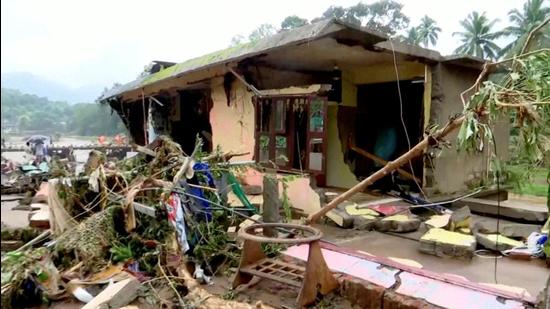Extreme weather events in Kerala linked to climate crisis: Experts
Experts link the fast-changing weather pattern in Kerala to the rise in surface temperature of the Arabian Sea in the last two decades, leading to higher cyclonic circulations.
The havoc wrought by heavy rain in Kerala last week in which 39 people were killed has a clear imprint of climate change, say weather scientists. In the last three years, the state has seen at least four flash floods of which the 2018 floods were the worst.

Scientists link the fast-changing weather pattern to the rise in surface temperature of the Arabian Sea in the last two decades, leading to higher cyclonic circulations.
According to the India Meteorology Department, there was a 52% increase in cyclonic movement over the Arabian Sea between 2001 and 2019, and an 8% decrease in the Bay of Bengal during the same period. IMD statistics showed that nine cyclonic or major depressions had formed in 2020, of which four were over the Arabian Sea.
Roxy Mathew, a planet scientist with the Indian Institute of Tropical Meteorology, Pune, said the temperature over the Arabian Sea has increased by 1.2 to 1.4 degrees Celsius in the last two decades.
“Usually, the temperature in the Arabian Sea is 1.5 degrees lower than the Bay of Bengal and this is one of the reasons for less cyclonic circulations and low pressure in the Arabian Sea. But of late, the situation is changing. What is disturbing is that warming is seen not only in the top layers of the sea but also in the deeper layers of the ocean,” Mathew said.
He added, “We all know that more than 90% of the heat on earth is absorbed by oceans. Usually, temperatures in the Indian Ocean and Bay of Bengal are above 28 degrees Celsius and in the Arabian Sea, it is between 26 and 28 degrees Celsius. But the Arabian Sea is warming up fast. It has been quite visible in the last decade or so.”
Dr Dr V S Vijayan, a member of the Madhav Gadgil committee on Western Ghats and founding director of Salim Ali Centre for Ornithology, said the state was yet to learn its lessons from the 2018 tragedy in which close to 400 people died.
“It is sad that in Kerala, discussions start only after a tragedy, but everyone forgets about it soon. Cloud bursts, flash floods and landslips are here to stay. The state will have to pay a heavy price if it goes ahead ignoring the climate change signals,” said Dr M G Manoj of the Advanced Centre for Atmospheric Radar Research with the Cochin University of Science and Technology.
Vijayan said Kerala can take the lead in implementing the UN General Assembly resolution of 2017 on sustainable development. “Our overdependence on natural resources will be reduced and we can think of a better tomorrow. Whether you take Uttarakhand, Kerala or the Northeast, calamities are leaving untold miseries. But for this, we need a committed political leadership,” he said.
The UNGA resolution is a set of suggestions to achieve a better and more sustainable future for all by 2030.
Noted ecological scientist Madhav Gadgil, who headed an expert group to study the degradation of the Western Ghats, said people will have to take more proactive roles to protect their place of living, surroundings, and environment.
“I agree that lopsided developmental activities have aggravated the intensity of natural disasters. But I still have hope from Kerala — it is the first to take up decentralised planning. Let people take up their bread-and-butter issues along with sustenance,” Gadgil said, adding that states like Maharashtra and Goa also experience similar tragedies year after year but Kerala gets wider publicity and reach.
Mathew said a big shift in the rain pattern in Kerala is visible. “Though monsoon rainfall may decrease, the number of heavy rainfalls will increase, leading to more flash floods and landslides,” Mathew said, adding that Kerala should have been very careful in land use because the state, endowed with many hills and rivers, has a slanting geographical landscape.
Apart from global warming, scientists have also found that the dumping of plastic waste in the sea has also led to a rise in surface temperature. According to a study conducted by the Central Marine Fisheries Institute of India in 2018, major oceans will have more plastic than fish by 2050. By then, over 850 metric tonnes of plastic will be found in the sea whereas fish will be 821 metric tonnes.
Another study conducted in 2017 by a world body, Alfred Wegener Institute, says the seas near Mumbai, Kerala and Andaman and Nicobar Islands are among the most polluted in the world.
Get Current Updates on India News, Lok Sabha Election 2024 live, Infosys Q4 Results Live, Elections 2024, Election 2024 Date along with Latest News and Top Headlines from India and around the world.




